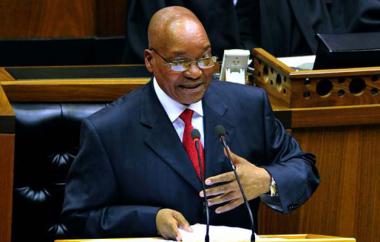The State of the Nation: Stimulating for property and power costs for business
 President Jacob Zuma delivers his state of the nation address at a joint sitting of Parliament in Cape Town yesterday.
President Jacob Zuma delivers his state of the nation address at a joint sitting of Parliament in Cape Town yesterday.
President Zuma vows to boost skills and jobs with a massive infrastructure development drive involving road, rail and water projects aimed at increasing mining, and expanding transport and logistics networks.
While Zuma claimed success in many areas, he conceded that unacceptable levels of poverty, social inequality and unemployment continued to plague the country.
In an otherwise unremarkable state of the nation speech last night, Mr Zuma appeared to put meat on the bones of his job-creation promises by announcing a large road and railway building programme. He announced five geographically focused infrastructure programmes designed to promote economic activity — especially in mining and agriculture — and to stimulate exports.
Business leaders welcomed his commitments last night but pointed out that Mr Zuma had failed to address the urgent needs of small business, which they said had the potential to create millions of jobs.
"For the year 2012 and beyond, we invite the nation to join government in a massive infrastructure development drive ," he said.
A presidential infrastructure summit would be convened to discuss the implementation of the plan with "potential investors and social partners", Mr Zuma said.
The infrastructure programme would be overseen by the Presidential Infrastructure Co-ordinating Commission, formed last September to prioritise and sequence infrastructure projects, and led by Mr Zuma and Deputy President Kgalema Motlanthe .
Mr Zuma said the commission had identified "a pipeline of strategic projects". These include:
— Integrated rail, road and water infrastructure centred on two areas in Limpopo: the Waterberg and Steelpoort. The aim was to "unlock the enormous mineral belt of coal, platinum, palladium, chrome and other minerals in order to facilitate increased mining and beneficiation". Rail transport would then be extended into Mpumalanga ;
— An improved Durban-Free State-Gauteng logistics corridor, which would be served by rail improvements, expanded port capacity and lower port charges for manufactured goods. The rail and port improvements would be part of Transnet’s R300bn capital expansion programme, expected to unfold over the next seven years. Of this amount, Mr Zuma said R200bn would allocated to rail and most of the balance to projects in the ports;
— Also part of Transnet’s capital programme is the expansion of the iron-ore export channel between Sishen and Saldanha and the phased development of a manganese export channel through the port of Ngqura (Coega);
— A southeastern node will build links between the northern part of the Eastern Cape and the Northern Cape and KwaZulu-Natal. A new dam on the Umzimvubu River would be built to expand agricultural production;
— In the North West, roads, rail and electricity would be expanded ; and
— On the west coast, infrastructure development could be used to unlock potential, Mr Zuma said.
The focus on infrastructure-led growth and the priorities put forward by Mr Zuma’s infrastructure commission dovetail well with the development plan of the National Planning Commission.
The commission, led by Planning Minister Trevor Manuel , concluded on the basis of a study of SA’s infrastructure needs that the Waterberg area, the Durban-Gauteng logistics line and the iron-ore line to Saldanha were areas where expansion would have the biggest economic effects.
Mr Zuma said that the issue of high port charges had been raised "sharply" with him by the automotive sector in Port Elizabeth and Uitenhage during a visit to the area last year.
He said the Port Regulator and Transnet had agreed to an arrangement which would allow exporters of manufactured goods a significant decrease in port charges during the coming year, equal to about R1bn.
He had also asked Eskom to "seek options on how the price increase requirement may be reduced over the next few years in support of economic growth and job creation", he said. "We need an electricity price path which will ensure that Eskom and the industry remain financially viable and sustainable, but which remains affordable especially for the poor," Mr Zuma said.
"However, to achieve sustainability, a pact will be required with all South Africans, including business, labour, municipalities, communities, customers and suppliers. We must save electricity."
To avoid load-shedding, everybody would have to play their part over the next two years, until the Medupi and Kusile power stations came into operation, he said.
Turning to the concerns of labour, Mr Zuma again pledged "to eliminate all forms of abusive practices inherent in labour broking". Discussions on this in the National Economic Development and Labour Council had been completed, he said, but he did not elaborate.
However, it is believed that while the government’s proposal does not ban labour brokers, it outlaws the worst practices, by restricting periods of temporary work to no more than six months, after which an employee will be deemed to be permanent. While the Congress of South African Trade Unions is planning a strike on the issue next month, Mr Zuma said he hoped "common ground will be found".
Economist Chris Hart said while the plans to reduce the cost of doing business should be welcomed, Mr Zuma’s address was more about the government’s role in propping up the economy, which appeared to leave the business sector behind.
He said the government needed to examine the regulatory environment, as that could undo any effort to lower the cost of doing business.
The speech also did not provide plans for small business — which could create millions of jobs.
Black Business Council spokes-man Sandile Zungu welcomed the focus on infrastructure that would assist mining, as that would boost export capacity. He echoed Mr Hart’s sentiment that Mr Zuma overlooked the small-business sector.
South African Chamber of Commerce and Industry CEO Neren Rau said the speech was detailed and a definite improvement on previous state of the nation addresses.













